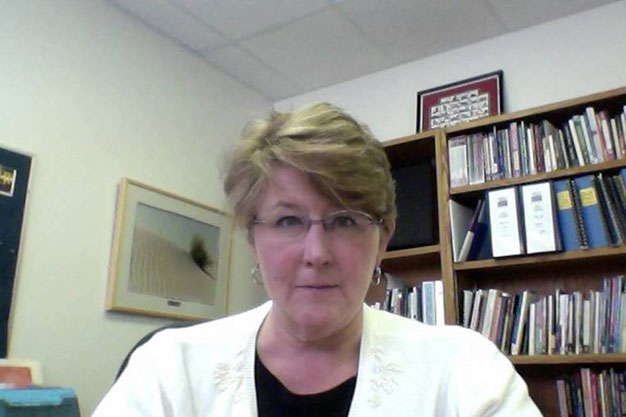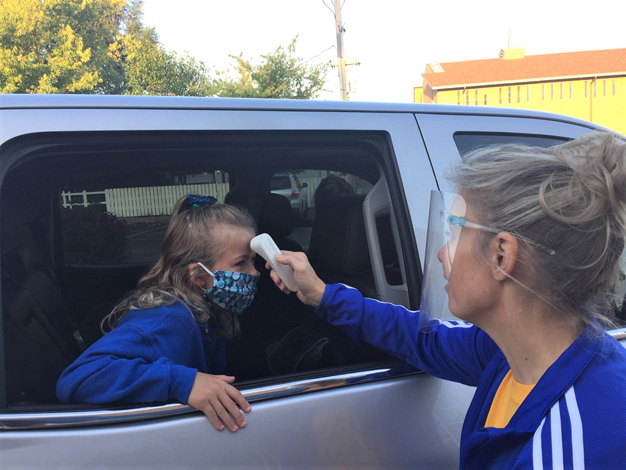
Lynne Devaney will serve as Superintendent of Schools for the Diocese of Davenport beginning July 1.
By Barb Arland-Fye
The Catholic Messenger
Lynne Devaney, a longtime educator who loves learning, is excited to return to Catholic education and Iowa to serve as Superintendent of Schools for the Diocese of Davenport beginning July 1. She will succeed Lee Morrison, who is retiring June 30.
Devaney, 63, serves as Director of Humanities for the Appleton Area School District in Appleton, Wisconsin, where she focuses on curriculum design and implementation of 21st century instruction. She previously served as Associate Superintendent for the Dubuque Community Schools from 2003-2016. Before that, she worked as an educator in the Archdiocese of Dubuque, where she had a passing acquaintance with Bishop Thomas Zinkula. “She was well respected by those engaged in Catholic education,” he said.
“I am honored to be invited to be the next Superintendent of Schools for the Diocese of Davenport,” Devaney, a cradle Catholic and native of Cascade, Iowa, told The Catholic Messenger. She appreciates the diocese’s search team for seeing her potential to add value to the diocesan school system. “I will try to live up to that. I’m not afraid to make sure we are challenging ourselves to do better … to take it to the next level.”
“Lynne is committed to her Catholic faith. She brings to this position considerable teaching and administrative experience in both Catholic and public schools,” Bishop Zinkula said. “She will hit the ground running. She has pretty much seen it all by now. Not only does Lynne have a diverse educational background, she also would like to make Catholic schools as accessible as possible to a diversity of families. She is focused on the primary mission of Catholic schools, not only providing an excellent academic program, but most especially transmitting the faith in an attractive, compelling manner.”
She may score some points in another way: accompanying her to Davenport is her 80-pound Goldendoodle, “Biscuit,” named for the character in the beloved series of children’s books. “Elementary school teachers will appreciate that,” she predicted.
Devaney began her career in the Dubuque Archdiocese as a teacher, primarily at the middle school level, before serving as a principal of two Roman Catholic PreK-8 elementary schools and then overseeing 20 Catholic schools in Dubuque County.
‘She also served as the primary support for parishes as they transitioned to a citywide governance model that created the Holy Family school system.
During 22 years in Catholic education in the archdiocese, “Every day I had the opportunity to work with great mentors who moved our system of Catholic education forward. I’ve always said it’s a privilege to pray where you work.”
She is certified as a PreK-8 elementary principal, PreK-12 superintendent and holds evaluator approvals for teachers and administrators in Iowa. She also has a superintendent’s certification for the State of Wisconsin and expects to receive her doctorate degree this spring from the University of Wisconsin-Oshgosh.
Whether in Wisconsin or Iowa, Devaney sought to approach her role as an educator and leader through the lens of her Catholic faith, which has shaped her mindset and worldview. She credits the education she received in Catholic schools from first grade through her master’s degree, as well as her early educator training nurtured by the Presentation sisters. Devaney holds fast to the passage from John’s Gospel where Jesus said, “I have come so that they may have life and have it to the full” (John 10:10).
Asked to describe her leadership style, she chuckles. “I’ve had people describe it for me. I have a very clear vision. I know clearly, what I feel, based on my experiences as an educator and leader in Catholic and public school systems, my faith and education. Having that knowledge, I can express myself fully … some people think I’m direct, I choose to think I’m clear.”
At the same time, “I am open to listening to what thoughts principals and teachers have; I like that collaborative relationship…. I like to look forward, asking, ‘What looks different tomorrow?’ not for the sake of change but for the sake of getting better.”
The principles of faith, hope and charity anchor her leadership style. She has leaned heavily on those principles, particularly when making difficult decisions, such as letting an employee go or dealing with a school closing. “I look for the common good for all in that moment. I like to think I walk humbly in that situation.” She asks the Holy Spirit to provide “the wisdom and the words to meet the challenge of that moment.” She knows she is not perfect. “That’s why I practice being Catholic every day.”
Devaney also respects the leaders who served ahead of her, which includes Morrison, with whom she has spoken about the Davenport Diocese’s Catholic school system. “I only stand on the shoulders of the person who stands in front of me.”
She recognizes that each school is unique. “I’ve been in enough schools in my career to know the need to get a feel for the culture and the climate. I’m looking forward to that.”







